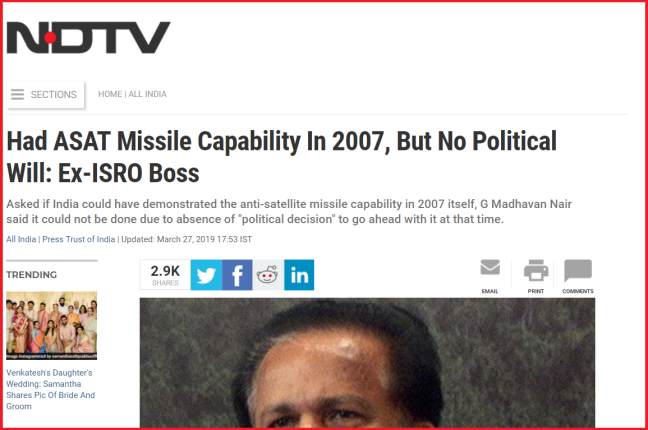In 2007, there were shivers around the world as the Chinese military shot down one of their old weather satellites in space.
And yesterday, India has joined the list of countries with this proven capability, a club that now consists of the United States, Russia, China and India.
The three big superpowers that will dominate the world by 2030 are in that list (Sorry, Russia).
Let me draw a picture of what next generation warfare would look like. Imagine if every Indian woke up to find that all of their money sitting in Indian banks had been digitally wiped out. There would be riots in the streets immediately and the country would become uncontrollable in a matter of hours.
The news of this banking catastrophe would spread across the globe. All over the world, from New York to Tokyo, confidence in the security of the banking system would immediately collapse. There would be a run on the banks by desperate people demanding their money in cash. The world would plunge into chaos which no government would be able to control.
Scary. But that is probably what the next war is going to be like. The Cold War generation grew up worried that the world would be destroyed by nuclear bombs. But now the concept of ‘mass destruction’ has moved to the sphere of communications, to servers that store our data, to undersea cables through which the internet flows and to space.
We Indians would never want to militarize space, but when others have already done so, it leaves us with no choice.
So what was the hurry? Why test this ASAT weapon now? Here’s why:

Because 25 countries are meeting right now in Geneva to create a legally binding international treaty to regulate the militarization of space.
We know exactly how these things work. It means that the treaty will create two classes of countries: the ‘haves’ and ‘have-nots’. Countries that already have this ability will never give it up. So the legally binding international treaties will allow them to keep their weapons, and any new country seeking to acquire this capability will be accused of ‘proliferation’, of war mongering and be inflicted with economic sanctions.
This is the underlying hypocrisy of international treaties. Perhaps there is no better model, but I would rather have India join the global space regulatory regime as a ‘have’ rather than a ‘have-not’. Wouldn’t you?
Remember that once these international treaties are written in stone, it is nearly impossible to change them. And the effects could last one hundred years.
Think about the UN Security Council. If Nehru had not turned down the offer of a permanent seat for India, things would have been radically different for India over the last 70 years. Only the other day, we complained rather helplessly about China supporting Masood Azhar at the UN. China knows they can do this with impunity and without consequences because India cannot retaliate by blocking their interests at the Security Council.
Everyone knows that the five permanent members of the UN Security Council no longer represent the five most powerful nations in the world, that the Security Council no longer makes sense without Germany or India or Brazil, but nobody has come up with a way to change it. India probably has the best case of all, but why would the existing powers want to share? And so the world power system of 1945 endures to this day at the Security Council. And although it is hopelessly unfair, it is here to stay. That’s just reality.
Think about the global nuclear regime.
The Non-Proliferation Treaty was signed in the late 1960s and it also created “nuclear haves” and “nuclear have-nots” among nations. The existing powers could keep their weapons and no new country could add itself to the list! How unfair is that?
Maybe unfair, but that’s how it went down.
And because India stayed out of the NPT, we became subject to a global boycott. Think of the crushing sanctions that were inflicted on us after the 1998 Pokhran test. Think of all the pain and effort that it took for Atalji’s Government (the Jaswant Singh – Strobe Talbot talks) and later Manmohan Singh’s government (the ‘waiver’ from Nuclear Suppliers Group) to slowly lift the sanctions and create a backdoor for India to “legalize” its nuclear program. The work is still not fully complete. But if only India had a chance to become a nuclear power before 1968, a half-century of victimization would have been avoided.
There’s no way India, as an aspiring superpower, should let this happen with space. We’re not going to get locked out of military technology in space. We are going to sit at the high table this time.
History would not have waited around for the General Election 2019 to be over.
As we came to know yesterday, India could have achieved this feat a long time ago. Both ex-ISRO chief G Madhavan Nair and ex-DRDO chief V K Saraswat confirmed this yesterday.


We always knew that we had the ability but were lacking in political will. We just didn’t know how badly the lack of political will was hurting us.



